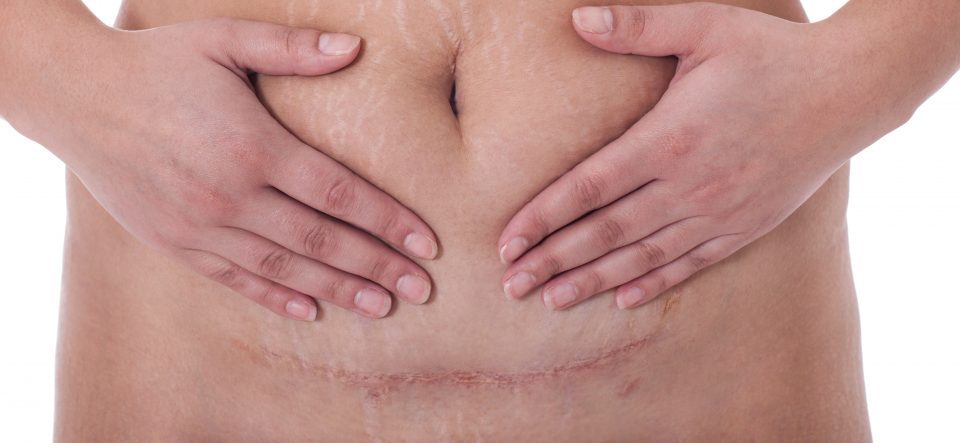The devastating drop in self-confidence suffered by C-section mums of all ages has been revealed in a new survey.
Almost 40 per cent admit they are less confident in their post-birth body – and 42 per cent now refuse to wear a bikini.
That figure hit around 60 per cent for those aged 18 to 34, while almost a third of the over 55s said the same.
The figures come after it was revealed C sections are on the rise in the UK and now account for more than a quarter of UK births. In 2015-16 approximately 173,000 Caesareans were carried out.
In the survey one in five women confessed to being too self-conscious to get undressed in front of their partner or to wear tight clothes.
Around a third suffered upset or concern due to their scar’s appearance – a figure virtually as high in women aged 55-plus as with 35 to 44-year-olds.
The findings were revealed in a survey of 800 British women by Fagron UK, the manufacturer of silicone scar gel Nourisil MD which treats scars left by wounds, burns, cosmetic surgery, general medical procedures – and C-sections – with a blend of silicones and vitamin E.
Peter Batty, Fagron UK’s general manager, said: “There are many reasons why a woman may undergo a Caesarean section.
“For those who do, there can be quite serious changes to the way they view their bodies afterwards.
“Of course, becoming a mum is a life-changing event, but the consequences of a C-section on self-esteem are not always considered until later.”
Nearly a quarter had taken steps to conceal their wound, with a sixth admitting to using a recovery gel at least three times a week.
The figure was highest in the 18 to 24 age group, where almost two-thirds revealed they tried to cover it up. Even in the over 55s, 12 per cent admitted to trying to hide their scar.
Peter continued: “While the mother and baby’s health are the clear priority, this survey shows women who have a Caesarean may be left with unexpected emotional scars. “With around a sixth of women saying they use a recovery gel, it is important they choose the best available.”
Seventy-nine per cent of those surveyed said they had been left a post-surgery scar. And 19 per cent – or 36 per cent of 18 to 24-year-olds – had experienced complications due to the operation.
Even a year after their operation, 20 per cent of women said their scar still hurt. That figure hit 36 per cent of 18 to 24-year-olds, and 11 per cent of women aged 55.
Despite discomfort, just four per cent thought about their scar twice or more a day, with it crossing the minds of 14 per cent a few times a week. Mums in Northern Ireland were most likely to dwell on it, with 23 per cent admitting to doing so at least twice a day.
The survey found women in the West Midlands were most concerned about the appearance of the scar, with almost half – 48 per cent – citing it an issue.
They were followed by those in Yorkshire and Humber, at 41 per cent, and London, at 33 per cent.
West Midlands women – at 52 per cent – were also the most like to suffer decreased body confidence, followed by 50 per cent in Northern Ireland.
Elective C-sections are planned, such as for a baby that is either in the wrong position or very large. Of these, there were 73,551 on the NHS in 2015-16, around 6,750 more than four years earlier.
In contrast, emergency caesareans are typically carried out because of complications during labour. Figures show an increase in these, from 97,054 in 2011-12 to 99,403 in 2015-16.
During the same period, conventional births dropped from 407,031 to 382,514.
Other common reasons for a C-section include the woman having a low-lying placenta or pregnancy-related high blood pressure, known as pre-eclampsia.
About Nourisil MD:
Nourisil MD contains five silicones and vitamin E which has been proven to fade, smooth and flatten scars while receiving associated pain and discomfort.
The gel includes polysiloxanes and tocopheryl acetate and works on all skin types by forming an invisible layer that hydrates and protects scars on all areas of the body, including the face.
After C sections wounds have fully healed and stitches have been removed, women are advised to gently massage Nourisil MD in twice a day.
Nourisil MD has been approved for the NHS drug tariff in England and Wales and will be available for prescription from February 2018. It is also available to order from Dermacare Direct.


